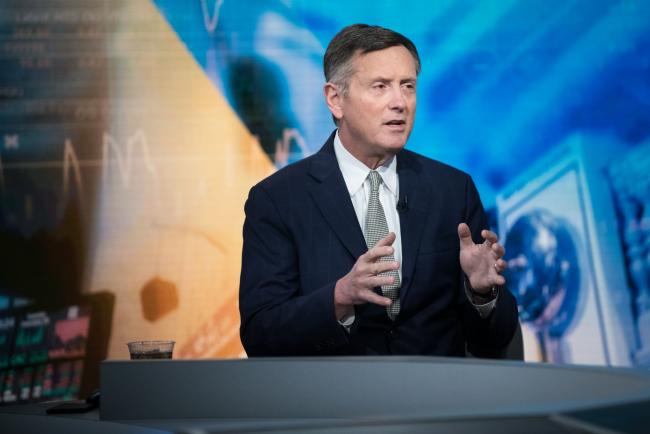
© Bloomberg. Richard Clarida, vice chairman of Federal Reserve System, speaks during a Bloomberg Television interview in New York, U.S., on Monday Nov. 1, 2019. Clarida reinforced the central bank’s new message this week that interest rates are on hold, saying that both monetary policy and the U.S. economy are
(Bloomberg) — The conditions required to begin tapering the Federal Reserve’s bond-buying program have “all but been met” amid high inflation and ongoing rehiring in the job market, Fed Vice Chair Richard Clarida said.
“I myself believe that the ‘substantial further progress’ standard has more than been met with regard to our price-stability mandate and has all but been met with regard to our employment mandate,” Clarida said Tuesday in remarks prepared for a virtual speech at the 2021 Institute of International Finance Annual Membership Meeting.
The Fed vice chair was referring to guidance the U.S. central bank issued last December pledging to continue buying Treasuries and mortgage-backed securities at a pace of $120 billion per month until the economy had made “substantial further progress” toward its employment and inflation goals.
At the conclusion of their most recent policy meeting last month, Fed officials said tapering “may soon be warranted,” and Chair Jerome Powell clarified in a press conference afterward that a vote to reduce the pace of purchases could come as soon as their next meeting in November.
U.S. inflation, as measured by the Fed’s preferred gauge, was 4.3% in the 12 months through August, well above the central bank’s 2% target. Fed officials including Powell have chalked up the elevated price pressures to supply-chain bottlenecks and other transitory developments tied to the reopening of the economy as the pandemic recedes.
Inflation Expectations
“I continue to believe that the underlying rate of inflation in the U.S. economy is hovering close to our 2% longer-run objective and, thus, that the unwelcome surge in inflation this year, once these relative price adjustments are complete and bottlenecks have unclogged, will in the end prove to be largely transitory,” Clarida said.
“That said, I believe, as do most of my colleagues, that the risks to inflation are to the upside, and I continue to be attuned and attentive to underlying inflation trends, in particular measures of inflation expectations,” he added.
Progress toward full employment has slowed in recent months as the delta wave of the coronavirus has slowed hiring in the U.S. job market. A Labor Department report published Friday showed net hiring of just 194,000 in September, well below expectations for a 500,000 increase.
Clarida, a Republican who was appointed to a four-year term at the Fed by President Donald Trump in 2018, voiced confidence that accommodative monetary and fiscal policies would eventually restore maximum employment while keeping inflation in check.
He pointed to the “support to aggregate demand from fiscal policy — including the nearly $2 trillion in accumulated excess savings accruing from (as yet) unspent transfer payments” authorized by Congress and the White House over the past year and a half.
©2021 Bloomberg L.P.
Source: Investing.com



























